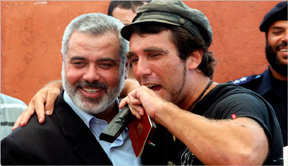 |
| Vittorio Arrigoni shares a stage with Hamas leader Ismail Haniya. |
Vittorio Arrigoni was, in plain terms, a terror tourist. He wandered the world looking for radical causes that would give his life meaning, eventually hooked up with the like-minded and pro-Palestinian International Solidarity Movement, and found his calling in supporting not just Palestinians, but specifically the extremist terrorists of Hamas. Inevitability he also adopted an extremely anti-Israel line, writing in his blog numerous times that Israel is “apartheid” and accusing it of “using weapons banned by international treaties” and passing “relentlessly racist laws.”
No surprise then that his murder in Gaza, at the hands of a terror group even more radical than Hamas, was the occasion for hagiography in the New York Times.
On the front page below the fold, Fares Akram and Isabel Kershner began their report with these sympathetic words:
For Vittorio Arrigoni, an Italian pro-Palestinian activist who friends said fought peacefully for justice, the end was as violent as it was incongruous. (“Killing of Pro-Palestinian Activist in Gaza Deals a Blow to Hamas,” Apr. 16, 2011)
The Times continued with their hagiography:
Mr. Arrigoni had dedicated his life to people he saw as oppressed, beginning his work as an activist right out of college and in recent years writing a blog and a book from Gaza. He was well known in Gaza City for his willingness to take chances to help make his case for the Palestinians …
Mr. Arrigoni first began championing causes in Africa and Eastern Europe, switching his attention to the Palestinians only later.
In a video posted on YouTube, Mr. Arrigoni said he came from a family of partisans. “My maternal grandparents fought and died against the occupation, another occupation, the Nazi occupation of Italy,” he said. “Probably for this reason it’s in my blood, my DNA, to push and struggle for freedom and human rights.”
In contrast, the Times has quoted no such kind words about Daniel Viflic, the schoolboy who was so gravely wounded in the Hamas bus attack a few days ago (and who died on April 17). In fact his name has never graced the pages of the New York Times (according to Nexis and google searches).* The Times did mention the bus attack in their article on Arrigoni, but only as a vehicle to generate more sympathy for the Italian, who was worried that the attack by his Hamas friends would provoke a response from the Israeli army:
In an e-mail to [a friend], he wrote, “I am very tense, exhausted, if [the Israelis] don’t kill anyone in the next 24 hours, I am getting out Thursday. Your V.”
